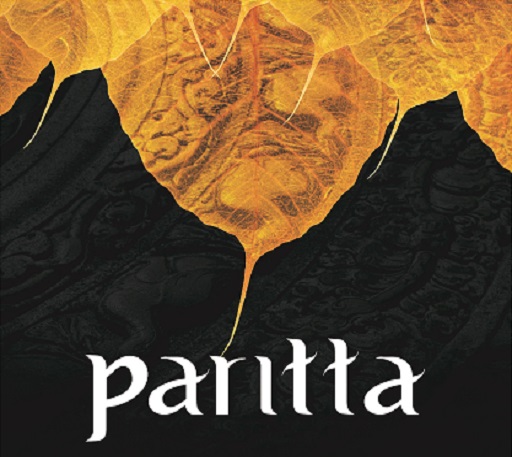No. 493.
MAHĀ-VĀṆIJA-JĀTAKA.
“Merchants from many,” etc. This story the Master told while dwelling at Jetavana, about some traders who lived in Sāvatthi. These, we hear, when going away on business bent, came with gifts to the Master, sheltering themselves in the Refuges and the Virtues. “Sir,” they said, “if we return safe and sound, we will kiss your feet.” With five hundred cartloads of merchandise they set out, and came soon to a wild forest, where they could see no road. Astray, waterless and sans food, they traversed the forest until, seeing a huge banyan tree which was haunted by dragons, they unyoked the carts and sat down beneath it. Looking upon its leaves, they saw them all glossy as though wet with water, and the branches seemed to be full of water, which made them think thus: “It appears as though water were running through this tree. What if we cut a branch of it facing the east? we shall find something to drink.” [351] On this one climbed up the tree and cut off a branch: out gushed a stream of water thick as a palm-trunk, and in this they washed, of this they drank. Next they cut a branch on the southern side: out from it came all manner of choice food, and they ate of it. They then cut a branch on the west side of the tree: out sprang women fair and beauteously adorned, with whom they took their pleasure. Lastly, they cut one of the northern branches: from it fell the seven things of price, and they took them and filled the five hundred carts, and returned to Sāvatthi. There they caused the treasure to be carefully guarded. Bearing in their hands garlands and perfumes and the like, they repaired to Jetavana and saluted the Master and paid worship to him, and then sat on one side. That day they listened to the preaching of the Law; and the next, they brought a munificent present, and renounced the merit of the whole, saying, “The merit of this gift, Sir, we renounce in favour of a tree-deity who gave us the whole treasure.” The meal finished, the Master asked them, “What tree-deity do you give this merit to?” The merchants told the Tathāgata the manner how they had received the treasure by a banyan tree. Said the Master, “This treasure you have received for your moderation, and because you have not given yourselves into the power of desire; but in former days men were immoderate, and were in the power of desire, and thereby they lost treasure and life both.” Then at their request he told them a story of the past.
p. 222
Once upon a time hard by 1 Benares was this same wild forest and this same banyan tree. The merchants strayed from the way and saw the banyan tree.
The Master, in his perfect wisdom, explained the matter in these verses:—
“Merchants from many a kingdom came, and all together met,
Chose them a chief, and straight set out a treasure for to get.
“To this parched forest, poor in food, their way the travellers made,
And spied a mighty banyan tree with cool and pleasant shade.
“There underneath that shady tree those merchants all did sit,
And reasoned thus, with folly clothed and poverty of wit:
“Full moist the tree is, and it seems as water there did flow:
One of the branches let us cut which to the eastwards grow.”
“The branch was cut; then pure and clear the trickling waters flow:
The merchants washed, the merchants drank till they had drunk enow.
“Again in poverty of wit, with folly clothed, they say,
“One of the branches on the south come let us cut away.”
[352] “This branch being cut, both rice and meat out in a stream it brings,
Thick porridge, ginger, lentil soup and many other things.
“The merchants ate, the merchants drank, they took their fill of it,
Then said again, with folly clothed, in poverty of wit:
“Come, fellow-merchants, let us cut a western branch away.”
Out came a bevy of fair girls all pranked in brave array.
“And O the robes of many hues, jewels and rings in plenty!
Each merchant had a pretty maid, each of the five and twenty.
“These all together stood around beneath the leafy shade:
These and the merchants in the midst, much merriment they made.
“Again in poverty of wit, with folly clothed, they say,
“One of the branches on the north come let us cut away.”
“But when the northern branch was cut, out came a stream of gold,
Silver in handfuls, precious rugs, and jewels manifold;
“And robes of fine Benares cloth, and blankets thick and thin.
The merchants then to roll them up in bundles did begin.
“Again they said in witlessness and folly, as before:
“Come let us cut it by the root, and then we may get more.”
“O then uprose their chief, and said, with a respectful bow,
“What mischief does the banyan do, good sirs? God bless you now!
“The eastern branch gave water-streams, the southern gave us food,
The western gave us pretty maids, the northern all things good:
What mischief does the banyan do, good sirs? God bless you now!
“The tree that gives you pleasant shade, to sit or lie at need,
You should not tear its branches down, a cruel wanton deed.”
“But they were many, he was one whose voice forbade them do’t:
They struck the whetted axes in to fell it by the root.”
p. 223
[353] Then the Serpent King, who saw them draw near to the root that they might fell the tree, thought to himself: “I gave these fellows water to drink when they were thirsty, then I gave them food divine, then beds to lie on and maidens to attend them, then treasures to fill five hundred waggons, and now they say, Let us cut down the tree from the root! Greedy they are beyond bounds, and except the chief of the caravan they shall all die.” Then he mustered an army: “So many armed in mail stand forth, so many archers, so many with sword and shield.”
To explain this the Master repeated a stanza:
“Then five and twenty mail-clad snakes stood forth and took the field,
Three hundred bowmen, and six thousand armed with sword and shield.”
[354] The following stanza is said by the Serpent King:
“Strike down the men, and bind them fast, spare not the life of one,
Burn them to cinders save the chief, and then your task is done.”
And so did the serpents. Then they loaded the rugs from the northern branch and all the rest of it upon the five hundred waggons, and conveyed the waggons and the chief of the caravan to Benares, and put up the goods in his house, and taking leave of him returned to their own place of abode.
When the Master had seen this, he repeated two stanzas of admonition:
“So let the wise his own good see, and let him never go
A slave to greed, that he disarm the purpose of his foe.
“So let him, seeing this evil thing, pain rooted in desire,
Shake off desire and fetters, and to holy life aspire.”
Having ended this discourse, he said, “Thus, Brethren, in days of yore merchants possessed with greed came to dire destruction, therefore you must not give place to greed.” Then having declared the Truths (now at the conclusion of the Truths those merchants became established in the fruit of the First Path)—he identified the Birth: “At that time Sāriputta was the King of the Serpents, and I was the caravan chief.”
Footnotes
222:1 Reading nissāya, as Fausbøll suggests.

![[PDF] The book of the Discipline – Vinayapiṭaka – The full 6 Volumes](https://en.namo84000.org/wp-content/uploads/2023/12/The-Book-of-the-Discipline-Vinaya-Pitaka.jpg)


![[En] Guide to Tipitaka](https://en.namo84000.org/wp-content/uploads/2021/10/Kinh-Phat-Quan-trong-2.jpg)